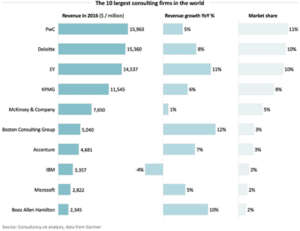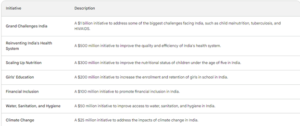With strings Attached.
| Relevance:
GS 2: Government Policies and Interventions for Development in various sectors and Issues arising out of their Design and Implementation. Tags: #Policymaking #GS2 #indianexpresseditorialanalysis #billandmelindagatesfoundation. Why in news? Governments should cautiously engage global consulting agencies for advice due to risks like compromised sovereignty, loss of local context, and potential conflicts of interest that might impact decision-making autonomy. Mismanaged Human Resources Development: A Troubling Trend · The management of human resources, a crucial aspect of India’s growth, is still lacking in value. · Governments at both the central and state levels, along with public sector entities, struggle to autonomously formulate rules, regulate practices, identify trends, and achieve declared goals. · In response, they increasingly seek guidance from global consulting firms. · However, the effects of outsourcing critical thinking only become clear over time, making assessment and measurement difficult. · This practice erodes the government’s ability to analyze, strategize, and govern effectively. · Example – Failure of Farm Laws, government’s inability to consult stakeholders, predict outcomes, and address citizen concerns led to widespread protests and unrest. Global Shift in Consulting Dynamics: Emerging Trends and Concerns · Sarbanes-Oxley Act 2002 : In the US, Act of 2002 restricts accounting firms from offering management consulting services to the companies they audit. This regulation aims to prevent conflicts of interest and ensure the integrity of financial reporting. Growing Backlash Against Consulting Practices Countries worldwide are re-evaluating their reliance on external consulting firms. · In 2016, Germany took a significant step by establishing a public sector consulting firm, seeking greater control over strategic decision-making. · Pricewater house Coopers Controversy in Australia: PwC, a global consulting giant, faced controversy in Australia, prompting government agencies to review their contracts with the firm. · China’s Crackdown on Multinational Consulting Firms: China has accused multinational consulting firms of engaging in corporate espionage on behalf of non-Chinese clients. This accusation has led to a clampdown on these firms, highlighting the complex relationship between consulting, global business, and national security. · Danish Case 2017: The Danish government concluded that outsourcing public sector IT responsibilities had negatively impacted governance. As a corrective measure, they established an in-house public sector body to regain control over critical functions. Outsourcing Governance: Challenges in India’s Approach · Aadhaar Data and Hosting Challenges: The management and security of sensitive personal information highlight the potential risks of outsourcing critical technological infrastructure and data management. · AGRISTACK and the Role of Market Actors: The Ministry of Agriculture and Farmer Welfare’s collaboration with the World Economic Forum to develop AGRISTACK · Showcases the trend of involving market actors in shaping regulatory frameworks. This raises questions about conflicts of interest and the potential influence of entities governed by these frameworks. · Dependence on Contractors and Decision-Making Autonomy: Increasing reliance on external contractors limits government autonomy, lack of control over decision-making processes and a diminished ability to change contracted firms, potentially hindering the government’s capacity to adapt to evolving needs. · Neglecting Local Expertise: Punjab’s decision to engage Boston Consulting Group for agricultural diversification bypasses state-level expertise. This approach overlooks valuable local insights that could contribute to more effective and contextually appropriate strategies. · J-PAL’s Engagement in Groundwater Management: Similar to Punjab’s current situation, the past government’s collaboration with J-PAL to reduce groundwater withdrawal demonstrates the trend of turning to external entities rather than leveraging in-house expertise · Deloitte’s Ambitious Roadmap for Uttar Pradesh: formulate a roadmap for achieving a trillion-dollar economy in five years is ambitious over 30% annual growth, challenging against 6% national average · Philanthropic organizations like the Bill and Melinda Gates Foundation, while contributing substantial resources, have faced criticism for allegedly influencing policy decisions by imposing their predetermined agendas Bill and Melinda Gates Foundation contribution in India Non-Neutral Advice and Hidden Agendas · Conflicts of Interest: consulting firms provide biased advice, conflicts of interest arise, compromising the impartiality required for sound decision-making. · Unfortunately, there are no laws that oblige consulting firms to disclose their clients’ names. · Some of these consultancies are well-known for offering their services for free or at a price that is significantly less than what it would cost the government since doing so opens the door for lucrative future contracts. · They make the most of their access to senior government officials to design and influence policy recommendations that genuinely help their customers in the private sector. · Numerous reports have been shown to be copied and pasted from international sources. · Grant Thornton helped the Ministry of Agriculture and Farmer Welfare create the 10,000 Farmer Producer Organizations. The program is not succeeding. Unaddressed Risks and Accountability Gaps in Consulting · Unaccounted Consequences: flawed consultancy advice or resultant harm remains unaddressed · Missing Officer Accountability: Officials who engage consultancies often retire without facing consequences for their choices. This lack of individual accountability reinforces a cycle of unchecked decisions. · Costly Outcomes: The cost of bad advise in terms of money grows. Consultancies are more expensive in the long term than growing capacity and improving processes. · Untapped Potential: administrative divisions prevent consultants from applying their insightful knowledge effectively. The potential advantages of the engagement may be undermined by underutilizing the deployed people. Unfair Consultancy Practices: Restricting Local Engagement · Biased Conditions: Public sectors and government departments often set biased “qualifying” conditions that deter local Indian companies from bidding. High turnover, employee count, and global offices requirements limit local participation. · Nepotism and Advisory Roles: The presence of retired bureaucrats and their kin in global firms raises concerns of nepotism and potential influence on consultancy decisions. · Expose of Influence: Works like “When McKinsey Comes to Town” shed light on hidden influence exerted by global consultancies like McKinsey, raising questions about their impact on national affairs. Government as Value Creator: Shifting Perspectives · Rethinking Governance: Rebuilding capabilities necessitates altering perceptions of the government from being seen as merely an inefficient value extractor to acknowledging its potential as a value creator in the economy. · Unfulfilled Potential of NITI Aayog: The NITI Aayog was expected to champion this transformative approach. Its role in promoting local capacity building and supporting partnerships with local firms becomes crucial for translating this vision into reality. · Family Connections Disclosure: To foster transparency, senior civil servants should annually provide confidential disclosures of any family members employed by multinational advisory firms The “outcomes” of very high-value contracts (let’s assume a threshold of Rs 10 crore per project) must be audited by the CAG or another relevant agency at the conclusion of any such consulting engagement. There doesn’t seem to be any relief at the end of this prolonged process. Source: Indian Express https://epaper.indianexpress.com/3755390/Delhi/August-30-2023#page/15/2 Mains Question Discuss the challenges and risks associated with the increasing reliance of government departments on global consulting firms for policy advice and development in India. How does this trend impact local expertise and decision-making processes?
|






